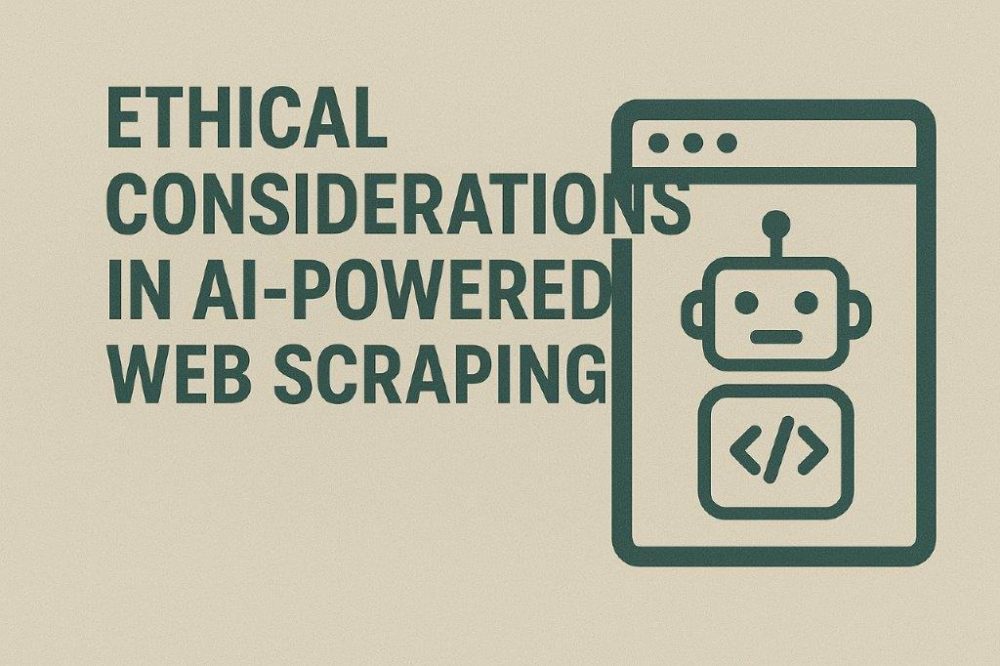The incorporation of Artificial Intelligence (AI) into web scraping tools has considerably transformed the scale as well as sophistication of data collection in the modern world experiencing digital transformation, where large volume of data is available in the internet. AI-powered scrapers are capable of navigating complex websites, while bypassing simple anti-bot measures along with intelligently extracting data points which traditional methods usually miss. Although this capability offers huge potential for market analysis, scientific research, as well as competitive intelligence, it also increases ethical as well as legal risks at the same time. Responsible data governance plays an important role, currently requiring a shift from asking “Can we collect this data?” to “Should we collect this data?”
The Triad of Ethical Risk
1. Privacy and Personal Data Compliance
The most instant and high-stake ethical concern is the collection of personally identifiable information (PII). AI is very skilled at consolidating different pieces of public data (e.g., a name from one site, an email from another, as well as a photo from a third) for creating complete personal profiles. This capability runs directly into the stringent requirements of data protection laws such as General Data Protection Regulation (GDPR), California Consumer Privacy Act (CCPA), and so on.
Even when the data is publicly accessible, these regulations help in protecting an individual’s right to control their personal information. Ethical scrapers must follow the principle of data minimization, which in turn allows collecting the data that is strictly required for an authentic purpose. Any collection of PII, even for AI training, requires a lawful basis for processing, such as clear consent or a documented valid interest which is balanced against the data subject’s rights. Failing to implement filters for avoiding or immediately pseudonymizing PII is not just unethical, it is considered to be a major legal charge.
2. Server Integrity and Resource Respect
AI-driven scrapers can operate at speeds as well as scales that can place an overwhelming load on a target website’s servers. Unlike human browsing, a poorly configured bot can launch thousands of requests per second, leading to denial-of-service (DoS) conditions, slower performance for recognized users, and increased hosting costs for the website owner.
Ethical scraping requires best practices demand which is regulating requests as well as implementing sophisticated delays between actions to mimic human behavior and minimize server impact. Furthermore, a responsible scraper must always check and respect the robots.txt protocol a file that signals which parts of a site are off-limits to automated bots. Additionally, ignoring this file creates challenges for site owner’s clear wishes and demonstrates a fundamental lack of respect for the digital ecosystem.
3. Intellectual Property and Creative Rights
AI models are often trained on massive, scraped datasets that include copyrighted material, such as articles, images, as well as product descriptions as this practice trains AI models for adhering to intellectual property (IP) rights. The commercial scraping and reuse of substantial portions of copyrighted content raises serious ethical and legal questions.
Ethical experts must assess the IP status of the content AI models scrape and understand the website’s Terms of Service (ToS), which often clearly prohibit automated scraping. Additionally, repurposing scraped content requires proper acknowledgement as well as a legal review to ensure it does not invade on copyrights or trade secrets, especially when creating derivative works like AI models.
Conclusion
The AI-powered web scraping requires an obligation to a rigorous ethical framework which is not only about avoiding lawsuits but also about encouraging a sustainable as well as reliable digital ecosystem. Enterprises must focus on openness and clarity, clearly recognizing scraping bot with an informative User-Agent string and having a strong, reasonable objective for data collection. Eventually, accountability for ethical practice lies with the developers and companies that are deploying the artificial intelligence (AI). Further, when available Constant monitoring, human-in-the-loop oversight, and a readiness to choose authorized APIs are necessary safeguards. Businesses can harness the immense power of web data by including privacy, server resources, as well as intellectual property into AI scraping strategies. This can be done while keeping ethical integrity as well as compliance with the laws.
